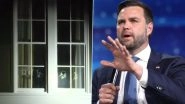London, Jun 1 (PTI) Seven former British foreign ministers have urged the Boris Johnson led UK government to form a global alliance to coordinate the response to the Hong Kong crisis as a result of China's new security law.
China is facing mounting criticism worldwide over a planned security law for Hong Kong, which would make it a crime to undermine Beijing's authority.
Also Read | Punjab Imposes COVID-19 Cess on Liquor: Live Breaking News Headlines & Coronavirus Updates, June 1, 2020.
In a letter to Downing Street, the cross-party group of former Cabinet ministers – including Jeremy Hunt, David Miliband, Jack Straw, William Hague, Malcolm Rifkind, David Owen and Margaret Beckett – call on the UK to be seen to lead the international response over its former colony.
“As events in Hong Kong develop over the weeks ahead, we hope you will recognise the pronounced need for international leadership from the UK government on this matter and act accordingly,” they wrote to Prime Minister Johnson.
“We believe the UK continues to have a moral and legal obligation to the people of Hong Kong,” they said.
The former ministers want a new international “contact group”, akin to one established for the Balkans in response to the Bosnia crisis in the early 1990s.
They also want Johnson to raise the plight of Hong Kong at the postponed G7 summit, to be hosted by US President Donald Trump, and to seek support from the Commonwealth and the European Union (EU).
The new security law in Hong Kong, which will be imposed upon the city by China in coming weeks, criminalises secession, sedition and subversion.
UK Foreign Secretary Dominic Raab has said the UK would not turn a blind eye to the plight of Hong Kong because the new security legislation "very clearly violates" the autonomy that is guaranteed under Chinese law as well as that in the 1997 agreement.
Hong Kong was handed back to China from British control on July 1 1997, under the special agreement.
“We are not going to turn a blind eye. We are not going to look away from our responsibilities, from the people of Hong Kong,” Raab said.
The former British colony enjoys some freedoms not seen in mainland China - and these are set out in a mini-constitution called the Basic Law.
But there are fears the proposed new law, which has sparked a mass of anti-mainland protests in Hong Kong, could compromise some of the freedoms guaranteed by the Basic Law.
Raab had also confirmed the prospect of an extension of visa rights for Hong Kong residents who hold British National (Overseas) passports, which would eventually lead to a path to citizenship.
The UK Home Office has said the pledge could apply not only to the estimated 350,000 BNO holders but an additional 2.6 million people who are eligible for such a passport, many who have previously held the document but not renewed it.
At present the passport holders can travel to Britain for six months but do not have the right to live and work in the UK, a policy which could be revised.
Meanwhile, the Chair of the House of Commons Foreign Affairs Committee, Tom Tugendhat, has also warned the UK needed to “rethink” its relationship with China.
“This is more than about Hong Kong, it is about all of us dealing with an authoritarian state which has decided to tear up the rules,” he said.
(The above story is verified and authored by Press Trust of India (PTI) staff. PTI, India’s premier news agency, employs more than 400 journalists and 500 stringers to cover almost every district and small town in India.. The views appearing in the above post do not reflect the opinions of LatestLY)













 Quickly
Quickly


